Playing for Others

Sorita Kyohei performs at the 18th International Fryderyk Chopin Piano Competition. (Photo from his first-stage performance.)
Photo: Wojciech Grzędziński/NIFC
“I like Japan, but I don’t.” Disconnecting from the Familiar and Heading Out into the World.
Sorita Kyohei, pianist
The performance I had dreamt about since I was 12, felt like it lasted but for a moment. It was the final round of the International Chopin Piano Competition [in 2021]. The 40 minutes I spent playing Chopin’s Piano Concerto No. 1, my most favorite piece in the entire the world, was also a passage of time where I realized my dream had come true after 15 years longing so deeply.
I placed second. I am the first Japanese person to achieve this since Uchida Mitsuko, 51 years ago [1970]. After winning second place, the perspective in front of me began to rapidly change right before my eyes. The goals and hurdles that had only seemed vague and muddy prior to this, came clearly into focus. It was almost as if I had taken off a pair of glasses and quickly put in contact lenses. After achieving the position of “Second-Place Finisher in the Chopin Competition”, I spent each day wondering how to change the classical music world in Japan.
A major reason for deciding to appear on stage for this competition was the existence of the Japan National Orchestra Co., Ltd. that I manage.
It all begin in 2018, two years after my debut. I gathered eight classmates, friends, and acquaintances, both older and younger than me, and formed a double quartet (a string quartet, but with two people per part). The following year, we added woodwinds and contrabasses to form a 16-person orchestra. In the end, we chose the name “Japan National Orchestra” and in May 2020, we finally managed to become incorporated.
I am told that this may have been the first example of an orchestra becoming a corporation in Japan. Even though there are many talented musicians here in Japan, there just aren’t many opportunities for young musicians to perform in front of others in concerts, etc. It’s frustrating see because there are so many young musicians who could lead the world. I became a president of this company, because I thought there was a need to create a world where young people could survive through music alone, and so I pay our members a salary as “employees.” Recently, I launched NEXUS, a music office, which operates concerts and manages musicians.
The Desire to Create a “Super Conservatory”
I originally had a dream to “create a music school on my own,” and I had been talking about it with those around me. When thinking about what I would need to make this a reality, a school-affiliated orchestra was a must-have. I want to go out into the world with a team of elite musicians and establish a track record.
Of course, even as an individual, I have the responsibility as “the first person to have said something to begin with.” Besides, who would come to a school if at some point I were to stand at the top of the school and the world were to ask, “Who in the world is this pianist?” First, I had to make a name for myself on a global scale, and then my orchestra would join me around the world. Thereafter, I would create a school. With this in mind, I made the decision to enter the competition.
That’s why I really felt relieved when I finished second. I knew that even if I were managing a company, holding online salons, and trying various other things, I would fail if I didn’t achieve concrete results in the competition. And if I didn’t, I was faced with the fact that others would say to me, “You failed because of overextending your reach. Musicians should just stick to performing.”
Behind my dream to build a school was a sense of danger I felt towards music education in Japan today and the world of classical music itself.
While there are music schools and music classes all over Japan, it is clear that managing these is slowly becoming more and more difficult due to the declining birthrate. If I were to say more, there are fewer and fewer children interested in classical music, and the population of those who want to study classical music is on a steep decline.
Under these such circumstances, should the Japanese educational institutions be so calm? If we do not create an environment suited for training our talented musicians, there won’t be an audience that will come to see a classical performance, say in 30 or 40 years from now. This is something I have put a lot of thought into.
In comparison to the number of schools we have in Japan, there just aren’t enough places where you can set eyes on these especially outstanding students. That’s the reason why, once I create the school of my dreams in the future, I want to set up not only general courses, but also courses that only the truly super-elite will be able to attend. We too must have the resolve to give our attention to the young people who truly wish to dedicate their lives to music.
Musicians Must be able to Self-Produce in order to Survive
Every year, there are about 10,000 new music college graduates, but among those, there are only a select few who are able to make ends meet as professional musicians. It’s safe to say this number is nearly zero percent. In terms of probability, i’s likely more difficult than becoming the prime minister. In such a difficult industry, it is the individual that will wind in regret with only a half-hearted aim to become a professional. I want the students to have the resolve and strong will to lay everything on the line in order to become a professional, and to hang it up if they can’t even get into the “Super Conservatory.”
Starting piano at a young age without knowing why and then going to a music college for one reason or another and vaguely aiming to be a professional, but in the end, giving up partway and working in a completely different job. There have been many young people like that around me.
I asked a young person why their parents paid these expensive school fees, and why they started and continued piano in the first place. The response was, “I would have like to have had the opportunity to perform as a professional if that had even been a possibility.”
Well then, in order to achieve that, did they even try to take action on their own? Perhaps advertising on social media, renting a small concert hall and gathering an audience on their own? Then, holding another concert with whatever small profit they gain from that show? No one does that. A passive vibe, where everyone assumes that “someone else will do it for them,” is vastly spreading in the world of classical music today.
When speaking with musicians from abroad from the same generation, I often hear the words “music festival.” Conversations of inviting others to perform at their music festivals takes place all the time. In Japan, it may feel like a large-scale effort, trying to figure out the music, attracting an audience, and then selling tickets. But in other countries, even in small classroom-size venues, they hold concerts over multiple days and call it a “music festival.” I find this casual nature to be quite wonderful.
Young people in Japan surprisingly do not have the ability to take this kind of action, being conservative and afraid to take risks. Those days must come to an end. Rather than overthinking and becoming unable to take the first step, my hope is that there will be more of those who will create their own space for their own performances without any hesitation at all.
I can say with confidence that within five years, there will be more musicians managing their own music companies. Social media has become more active since the start of the Reiwa era (2019–), there has been in increase in YouTuber pianists, and spaces for artists to express themselves are on the rise. You might say that this is a time in which musicians must be able to self-produce in order to survive.
Naturally, this type of education will also be required of music colleges. Let’s call it ‘a self-production course’. The truth is, even though the universities teach technique in this day, there are hardly any classes that teach the students how to make a living as a musician. I’m still new to management and have a very long way to go, but that’s why I’m learning under the wings of. DMG Mori Co., the sponsor of the Japan National Orchestra.
To begin with, there is something about the world of classical music in Japan, where everyone thinks it is embarrassing to ask about what one may need in order to advance and succeed. This may not be limited to music alone and could possibly be said about all fields of art, but there is this unusually strong negative reaction towards the idea of “making money.” It’s all around me.
There are various aspects in which money becomes necessary, including that of making a living and having as well as supporting employees. I think it is highly commendable and not in the least embarrassing to think of ways to make money and live through music. Besides, and this pertains not just to the performances, but if a musician is not able to educate themselves and think about the various things associated with performing, then they will never be able to become a world-class musician.
“Samurai” Hairstyle and Body Building
In preparation for the Chopin Competition, I of course trained hard, but also placed a significant amount of thought into my appearance. My hairstyle was part of that: my jaw-length bob cut pulled back into a ponytail. I first began my studies in Russia, my teacher told me frankly that “unless something about me were to stand out, people wouldn’t be able to tell my face apart from other Asians.” In fact, I was hard for me to tell the difference between Russians, Ukrainians, or Belarusians. Since then, I’ve kept this same hairstyle in hopes that people would call and remember me as the “samurai” when performing overseas.
Actually, the Sorita family is from a line of samurai families or so I’m told (LOL). Just before my grandfather died, he gathered the entire family together and told us that “the ancestors of the Sorita family served Takeda Shingen“ [editorial note: 1521–1573, one of the most powerful feudal lords in the Sengoku period in the 16th century] This story almost seems too good to be true, but I think it was in the back of my mind all along, and it may be the reason why I decided to create the “samurai” image by growing out my hair and my beard.
I also worked on body building. At the gym, I worked with a trainer to build up my shoulders, arms, and leg muscles to support my core when performing. There are plenty of musicians who are plump, but none who are buff. I have always wondered what kind of sound I could produce with muscles all over my body. I have always been the type of person who isn’t satisfied until I find the answer to whatever I’m wondering about.
Sure enough, my sound became firmer, so I decided to change the muscle into fat. This meant there was no special training, just eating (LOL). I reached the ideal body in about a year and discovered that the original depth to my sound had returned.
In reality, muscles are essential in aiming for the global stage. In Japan, the performance spaces are unparalleled to the world over in terms of acoustics, etc. However, abroad, the locations and setups are incredibly diverse. You might play at a church, as “people consider any place with a piano to be a concert hall,” or you might perform at an opera houses, where the stage is the main attraction. The thick and solid, red cushions on the seats wind up absorbing the sound and the music is unable to travel very far. The capacity of these opera houses is usually greater than of those in Japan.
Basically, half of the Warsaw Philharmonic Concert Hall, which was the venue for the Chopin Competition, is a theater, and as such, I knew that the sound would not carry very far in the physique I had at the time. As far as this aspect was concerned, the only thing that would work was to a larger body. It is imperative to build the muscles so that the music can reach the audience near and far, when performing on an overseas stage. This is also fact that needs to be properly taught in an educational setting.
A Country Where “Copies” of Teachers are Mass-Produced
This is not limited to music, but in Japan, we are expected to look at those around us and keep up with them, and this is what is casting a shadow on music education. Teachers and students do not have discussions. If the teacher says in a lesson, to slur here and then crescendo, then you are expected to play it that way without any question. Because it there are no questions “why,” there can’t be any free interpretations of compositions, even though “copies” of teachers are produced in large quantities. Overseas, it is normal for students and teachers to have discussions.
Since I began taking lessons in Japan, I was always blunt with my teachers when I didn’t understand their interpretation, especially when it was different from what I wanted to play. Without hesitation, I would ask my teachers, “Have you ever met the composer?” I was a truly terrible student (LOL).
But I believe that there is no correct interpretation in music, and beyond playing the piano, I am a person who likes to express myself. There are tens of thousands of ways to move between just two notes, from C to D. Why I choose to express in the way that I do and how I would take into account the intent of the piece and the composer? I was prepared to put all of this into words.
“I Have Some Harsh Things to Say”
I don’t mean to be rude, but when looking at pianists alone, I believe that there has not been a star in Japan since Uchida Mitsuko from 51 years ago.
Soon after returning to Japan after the Chopin Competition ended, I was invited to a sort of public meeting related to the world of classical music in Japan by the Agency for Cultural Affairs (ACA) and the Ministry of Education, Culture, Sports, Science and Technology (MEXT). After excusing myself in advance by saying, “I have some harsh things to say,” frankly, I conveyed almost everything I had on my mind. I asked what ACA had been doing for the past 30, 40 years, and what Japan was doing.
There have been first place finishers in the Chopin Competition from South Korea, China, and Vietnam, but none yet from Japan. There have been no stars, and even fewer people who have taken action in considering the future of the world of classical music. There are scholarships for studying music abroad, issues about visas, and grants. I spoke about how we need to re-examine the circulation of money and pour it into education that is truly needed.
Ideally, I want people who understand and have a deep knowledge of classical music. or music in general, to lead ACA and other ministries that steer the nation… even better if they were artists. For example, I performed a piece, the other day, by Ignacy Jan Paderewski (1860–1941) in the NHK Symphony Orchestra’s periodic concert program. Paderewski was a Polish composer who lived between the 19th and 20th centuries. He was a pianist, worked as Prime Minister, and in his later years, was involved in compiling the Chopin Complete Works. It can be said that the fact that the Polish people and indeed the world still love Chopin today is because of Paderewski’s accomplishments. I would be happy if this sort of person appeared in Japan, and I think it will be problematic if we don’t. Japanese students aiming to be professionals should go abroad at least once. I learned so much while studying abroad, first in Russia from age 20 and then in Poland from age 23. I came in first place in the Music Competition of Japan in 2012 when I was 18. I was the youngest man to win in the competition’s history, and was given a lot of attention. There were many interviews, and this continued until I was in that period of life where I was most attractive. The world of classical music is very interesting. People who can play well are seen as attractive. It’s not about looks or personality. After school, students from other schools would be waiting for me outside the school gate. It was like something right out of the manga Nodame Cantabile. So much so that I started to believe, “I might be a genius.”
Then on day, I woke up. I realized that a year later, “another first place finisher in Japan would emerge.”
I felt I needed time to properly study in a place where no one knew about me, and so I decided to go to Russia.
The Grim Reaper’s Sickle at My Throat
So I went to Russia, and I had to start from the bottom. At the Moscow Tchaikovsky Conservatory where I studied, all students that didn’t speak Russian had to attend the preparatory course. In the first class, the Russian teacher asked all the students, “What is your repertoire and how much have you been involved in concert activities,” but I took it as a joke and responded by saying, “I only just began playing the piano recently.” This was accepted as fact, and I was labeled “the person who could play piano the least.” For a year, I had to endure the teacher’s cold treatment.
Russia is truly difficult for Asians. We encounter racial discrimination, the sun doesn’t come up for a week when it’s well below zero centigrade, there is no hot water, and toilets don’t have seats. If you walk outside, you might be murdered. A sickle with a 40-cm curved blade that only the Grim Reaper would have was thrust at my throat once.
The fact is, there aren’t really any other countries that are better equipped than Japan. At music colleges, there are tens or hundreds of practice rooms and each one of the pianos is properly tuned. All three pedals and 88 keys are there, and the fact that the white and black are properly painted is in and of itself not always the case overseas.
In Russia, it is difficult to secure a practice environment. There are few practice rooms so it is hard to grab one, and even if you do, the pianos are in terrible shape. I still remember a piano where the keys were like rocks and even if you pressed them, they wouldn’t come back up and no sound was produced. Since there was no sound, the only thing to do was image training. Another piano had the paint peeling off and the wood underneath exposed. When playing, my hands were pummeled by splinters and before I knew it, they were bleeding. It was during this time that I learned to read music without a piano and to have the sounds play in my head. Since there were so many things that happened in the first year, I decided to place first in the test to progress to the Conservatory and be the key performer in the entrance concert. I did so thinking that something would change if I did.
Apparently, the teachers looked at the performance order and thought that I was last because I needed supplementary lessons in the morning. However, I actually placed first and entered the Conservatory at the top. When I played Schubert’s Impromptus and Liszt’s Widmung at the concert, people in the audience were in tears. Many Russian language teachers from other classes also came to see me perform.
I felt really content and headed to my next Russian language class. Come to find out, my teacher had listened to the performance of the student right before me, and then left because they thought I couldn’t play anyway. I was speechless (LOL). But the other teachers told my teacher about the concert, so after that, the teacher’s attitude completely changed. It was interesting to see how the people around me started to change after just one concert. It was the same at the Chopin Competition.
The world is not an easy place. However, I believe that we have to live through the hardships in order to make good music. The reason is because the composers themselves went through their various hardships and full of various thoughts and feelings. Surely no one has come to create music while living in a life of only happiness. This is why musicians cannot express the emotions incorporated in music or create their own sounds unless they live lives comparable to composers.
For many reasons, I like Japan, and for many other reasons, I don’t. It’s too safe, making us lazy. We have to disconnect ourselves from “the familiar” and head out into the world, or we’ll never become a true musician.
“Play the Music You Like in the Way You Want To”
For those of us currently involved in the world of classical music in Japan, we need to seriously heed the fact that students from abroad do not come to Japan to study music. The Tokyo Olympics were just held in 2021, and there are many World Natural Heritage and Cultural Heritage sites in Japan. The cherry blossoms are beautiful, food is delicious, and it is very attractive as a tourist destination. However, when it comes to music education, no one comes to Japan for it. We need a centripetal force.
I would like my school to be a place where many students from around the world will come to learn. I want to start by first communicating just how fun music can be. I feel like the teaching of joy has completely disappeared from music education in Japan. “Have you forgotten the sense of joy you had when you first started music? “Don’t you think that passing on that joy is what nurtures our future musicians?” These are questions I would like to ask.
When I was four and began taking lessons, the piano was nothing but a toy to me, and it was fun that it made a sound when you pressed the keys. Both of my parents knew nothing about music, and they had me take lessons because they casually thought it wouldn’t hurt to train my ears or that it might help me get over the fear of being in front of people.
I really loved my teacher. My teacher, who was 27 at the time (which is also my age now), looked just like the television personality, Nasubi [editorial note: a stage name derived from the word for eggplant in Japanese, actual name: Hamatsu Tomoaki] and it surprised me, as I liked Tensai TV-kun, an NHK TV show that was hosted by Nasubi. When my mother took me to my lesson after I watched the recorded TV show in the morning, there was Nasubi. “Um, mom. Isn’t this Nasubi?” I was really excited to be learning piano from Nasubi!
My teacher had a habit of saying, “Kyo-chan [editorial note: his nickname for me], Kyo-chan, you can bring the music you like and play it how you want to.” He was always so kind and he complimented the way I played all the time. I learned the joy of music all from him.
My local friends started to have interest as well. The kids around were the types who “loved running around” and probably never would have listened to classical music if I hadn’t learned to play the piano. But my friends would ask me things like, “Hey, Sori [editorial note: another nickname], play that song by Debussy,” and they were happy when I played for them.
Since I was very young, I was praised when I played the piano, and it made others happy. Because I grew up in that kind of an environment, I became aware of why I was playing and who I was playing for in a natural way.
Artists That are Full of Love
I want students today to think about “why they’re playing music” and “who they’re playing for.” I get the sense that there aren’t many people who properly think about this, not just in Japan, but surprisingly, also around the world.
You become a musician when there’s someone who “wants to hear you play,” and a performance becomes a concert when there’s an audience to see it. This is the basic premise we must never forget.
The most in-demand artists around the world are the ones who are full of love. They are the ones who have experienced many things in life, they have depth, and are personable.
For example, say we have seven colors of paint here. As children, we only know how to use the colors as primary colors and don’t know how to express the seven colors in any other way. However, as we become adults, we learn how to create various colors by adding this to that to create a color or by adding a little more water to lighten the color, or to create a vast range of colors. In other words, we continue to gain knowledge and experience that allows us to do things.
Sound is the same. We play in the way that we do because humans have emotion. The more knowledge and experiences we gain, the more we are able to present in expressive sounds. Even when playing a song, many of the composers of classical music, such as Mozart and Chopin, are no longer with us. We cannot ask the composer directly what the true meaning of the pieces are. And so, imagination is the most important thing of all, and it is best to increase one’s knowledge and experience as much as possible. When it comes down to it, I believe that those who survive as true musicians are those who continue to have goals for “a certain person” or “to achieve something.”
I Want to Travel the World while Performing
My ideal portrait of a musician is Mozart. He was a composer, a performer, and a music conductor, all on his own. He played both the violin and piano, he sought out patrons, and he traveled… A time when musicians were able to do everything related to music on their own is my ideal.
Moving forward, I want to gradually build up my career with Europe as my base. Concerts have been confirmed for 2023 in several countries and regions that I have yet to visit. The purpose of appearing in competitions was to become famous and bring my orchestra to the world, but more than anything else, it was to travel the world, performing as a solo pianist. That is the true pleasure of being a musician.
I have always been the type who is unable to stay in one place. I love to move around. I love to travel. Currently, I have a home in Poland, but I plan to rent a place in Vienna as well, and I think I will rent a place in other countries, too. I want to continue to travel.
This year, I will study to be a music conductor with a teacher in Vienna. I have been composing little by little, and it Feel like I’m getting closer and closer to reaching my goal of becoming an all-rounder just as Mozart was.
I will bring home to Japan the sights that I’ve seen and the experiences I’ve accumulated abroad, and in the not-so-distant future, I will create a school where students from around the world will come to study. I want to be there the moment a graduate from my school becomes the first Japanese person to be awarded first place in the Chopin Competition and is showered with applause while on stage. I guess in order to do so, I’m going to have to involve those who have not really been interested in music up to now and turn them into lovers of classical music. I may have missed first place this time, but I intend to keep the Chopin Competition rage in motion, at least until a Japanese person seizes first prize.
As a teacher, I want to teach the musicians of the future. I want to teach them that what we need is the desire to play for someone else. Besides, in the end it’s all about the love. Yes, the love .
Translated from “Hokano darekanotameni hiku: Sorita Kyohei (pianisuto) Jitakude intabyu ni kotaeru (Playing for Others: Sorita Kyohei, a pianist, interviewed at his home),” Bungeishunju, March 2022, pp. 148-157. (Courtesy of Bungeishunju, Ltd.) [August 2022].
Note: This article was compiled by Bungeishunju and edited by Tsuyama Keiko.
Keywords
- Sorita Kyohei
- pianist
- Tsuyama Keiko
- journalist
- International Chopin Piano Competition
- Chopin
- Piano Concerto No. 1
- Uchida Mitsuko
- Japan National Orchestra
- NEXUS
- classical music
- music education
- professional musicians
- music festivals
- Russia
- Moscow Tchaikovsky Conservatory
- Ignacy Jan Paderewski
- Music Competition of Japan
- Mozart




